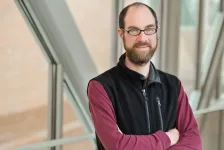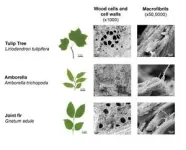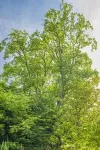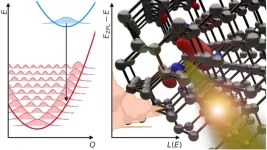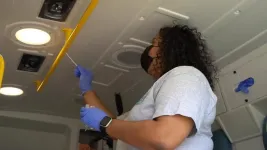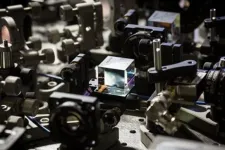(Press-News.org) “Sometimes the crazy ideas lead to watershed improvements.”
That was a key takeaway from new research conducted by Utah State University, published in the American Society of Civil Engineer’s Journal of Water Resources Planning and Management. Using Google Sheets during video calls, 26 Colorado River Basin managers and experts took on water user roles to discuss consuming, banking and trading Colorado River water.
As Western states face aridity and reservoir levels depleting, more of the water available for consumption and conservation comes from reservoir inflow, not storage. Water banking gives users more flexibility to respond to variable inflow and declining storage. Banking contrasts with current river management that requires California, Arizona, Nevada and Mexico to reduce their consumption as Lake Mead levels decline.
“This immersive, online and collaborative approach was different from previous methods that relied on offline models or complex computing systems to predict water needs and set rules,” said David Rosenberg, the study lead and professor in the Civil and Environmental Engineering Department. “This method allowed participants to directly interact and collaboratively improve reservoir operations.”
Collaborators stated that the modeling project was fun, more holistic and encouraged them to think about equity issues. Several collaborators also shared that a Lake Powell-Lake Mead water bank would be “a huge leap from management today.”
Feedback from those 26 managers and experts helped improve the collaborative process, increase flexibility, and generate new insights for management. Rosenberg’s research identified 10 key takeaways.
Model to provoke discussion about new operations rather than propose a solution. This is a desirable prelude to more formal evaluation of solutions or quantifying tradeoffs.
Solicit feedback early to allow collaborators to improve a management alternative and the online environment in which the alternative was modeled.
Identify points of conflict to focus limited time during model sessions to provoke discussion on future operations rather than mediate or try to resolve conflicts.
Provide model options showing different ways to approach points of conflict. Options turn conflicts into choices. Collaborators can then think about and discuss the choices.
Prorate reservoir evaporation by water account balance. Parties with larger account balances shared more responsibility for reservoir evaporation.
Many options exist to prevent reservoir draw down below the protection volumes specified in federal regulations.
Allow trades to increase management flexibility. There was much active trading within the collaborative model environments.
Manage the combined storage in Lake Powell and Lake Mead to offer more flexibility.
Find common benefits such as ability to more adaptively manage one’s available water more independently of other users.
Recognize the limits of a model’s acceptability and potential adoption.
Rosenberg’s research follows on previously published works in 2023 and 2022 that showed other ways to adapt Lake Powell and Lake Mead releases to variable inflow and declining storage.
“I am excited to use immersive, online and collaborative models in other river basins and at different spatial and temporal scales,” said Rosenberg.
For more information, click here.
END
New collaborative research generates lessons for more adaptive lake management
2024-07-31
ELSE PRESS RELEASES FROM THIS DATE:
Former Cal Poly biological sciences professor first Cuban-American to be inducted into the Academy of Sciences in Cuba
2024-07-30
The first Cuban-American to be inducted into the Academy of Sciences in Cuba is a retired Cal Poly biology professor and renowned microbiologist.
In May 2024, Professor Emeritus Raul J. Cano was awarded membership in the Academy’s headquarters in the National Capitol building in Havana.
Cano, who previously received national attention for his work with amber dating back millions of years, has been heavily involved in research and clinical projects in Cuba over the past five years.
Cano partnered with Clinical Hospital Hermanos Ameijeiras in Havana for clinical research in probiotics. ...
A brain fingerprint: Study uncovers unique brain plasticity in people born blind
2024-07-30
WASHINGTON (July 30, 2024) — A study led by Georgetown University neuroscientists reveals that the part of the brain that receives and processes visual information in sighted people develops a unique connectivity pattern in people born blind. They say this pattern in the primary visual cortex is unique to each person — akin to a fingerprint.
The findings, described July 30, 2024, in PNAS, have profound implications for understanding brain development and could help launch personalized rehabilitation and sight restoration strategies.
For decades, scientists have known that the visual ...
NIFA grant supports innovative blackberry research in Arkansas
2024-07-30
FAYETTEVILLE, Ark. — Ryan Dickson, an assistant professor of horticulture for the Arkansas Agricultural Experiment Station, has been developing research since 2018 on growing blackberries indoors and recently secured a nearly $750,000 grant to further that work over the next four years.
The experiment station is the research arm of the University of Arkansas System Division of Agriculture and is home to the largest public-sector breeding program for fresh-market blackberries in the United States. ...
Bright prospects for engineering quantum light
2024-07-30
(Santa Barbara, Calif.) — Computers benefit greatly from being connected to the internet, so we might ask: What good is a quantum computer without a quantum internet?
The secret to our modern internet is the ability for data to remain intact while traveling over long distances, and the best way to achieve that is by using photons. Photons are single units (“quanta”) of light. Unlike other quantum particles, photons interact very weakly with their environment. That stability also makes them extremely appealing for carrying quantum information over long distances, a process that requires maintaining a delicate state of entanglement for an extended ...
New high-resolution 3D maps show how the brain’s blood vessels changes with age
2024-07-30
HERSHEY, Pa. — Healthy blood vessels matter for more than just heart health. Vascular well-being is critical for brain health and potentially in addressing age-related cognitive decline and neurodegenerative disorders, like Alzheimer’s disease, according to new study led by Penn State researchers. The findings point to an understudied but possible key role the brain’s vascular network — or energy infrastructure — plays in the onset of neurodegenerative disease.
They published their work today (July 30) in Nature Communications.
Using advanced imaging techniques, the team developed maps of a mouse brain that illustrate ...
Genes or environment? A new model for understanding disease risk factors
2024-07-30
HERSHEY, Pa. — Every disease is shaped by a genetic component as well as environmental factors like air pollution, climate and socioeconomic status. However, the extent to which genetics or environment plays a role in disease risk — and how much can be attributed to each — isn’t well understood. As such, the actions individuals can take to reduce their risk for disease aren’t often clear.
A team led by Penn State College of Medicine researchers found a way to tease apart genetic and ...
Study reveals impact of concern about misinformation on Americans’ media consumption habits
2024-07-30
Most Americans are aware of fake news and misinformation. In a new study, researchers from the University of Pennsylvania sought to uncover whether the threat of misinformation drives Americans to seek out news sources that reflect their own political beliefs.
The study, published in the Harvard Kennedy School Misinformation Review, found that Democrats, older individuals, and those with higher education levels are more concerned about misinformation in general and that, compared to Republicans, ...
USF students will swab first responder vehicles through a CDC-funded infection control initiative
2024-07-30
TAMPA, Fla. (July 30, 2024) – University of South Florida students are leading infection control training for fire and emergency medical services personnel as part of a groundbreaking initiative supported by a multi-million-dollar cooperative agreement with the Centers for Disease Control and Prevention.
This fall, student research and project assistants will begin swabbing first responder vehicles, ambulances, fire trucks and equipment to identify pathogen exposure risks and enhance training.
“By working on this aspect ...
Grainger Engineers to lead Illinois Quantum and Microelectronics Park, shape the future of quantum computing
2024-07-30
Today, The Grainger College of Engineering at the University of Illinois Urbana-Champaign joined other partners from around the state in officially announcing its leadership role in the Illinois Quantum and Microelectronics Park. The project – a quantum-focused research and development campus in Chicago – will be managed by a University of Illinois-led organization on behalf of the State of Illinois and Governor J.B. Pritzker.
Advances in quantum information science and engineering, together with next generation microelectronics, promise to transform computing, which underpins much of how our modern society operates. Grainger Engineering Associate Dean for Research ...
Research warns of “systematic weaknesses in jury decisions”
2024-07-30
There are “systemic weaknesses” in the way juries make decisions – and these are likely to be contributing to the conviction of innocent people, failures to convict the guilty, and inequalities, new research warns.
The current legal rules involving procedure and evidence are not consistently designed based on robust evidence about how the juries make decisions, but the system could function better, according to a new book.
Dr Rebecca Helm, from the University of Exeter, outlines how juries are likely to struggle to make effective legal decisions in predictable case types, including cases involving sexual offences in which testimony ...
